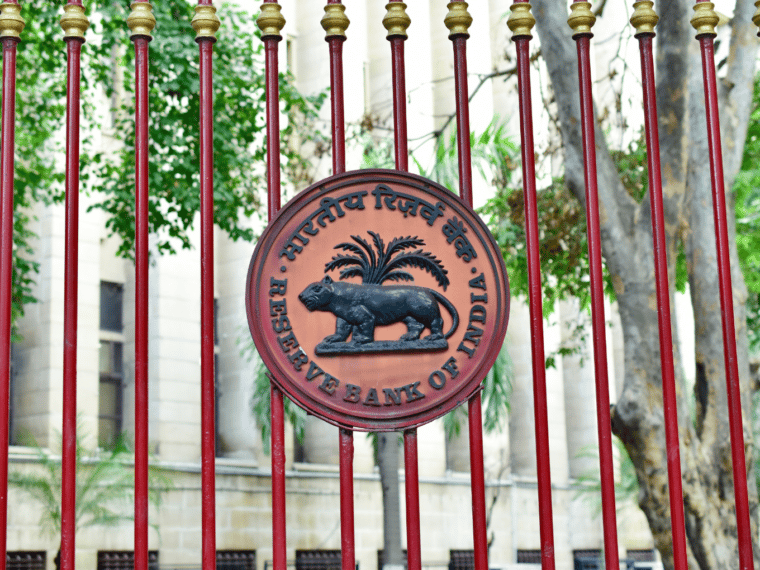
The release of the guidelines has ended the long wait of many fintech startups as lack of clarity had made banks and NBFCs wary of tying up with fintechs to launch their products
FLDG is a contractual agreement between regulated entities and lending service providers under which the latter agree to compensate the REs for the loss caused due to default of up to a certain percentage of their loan portfolio
Through the guidelines, the RBI has capped the total amount of DLG cover on any outstanding portfolio at 5%
The Reserve Bank of India (RBI) on Thursday (June 8) released default loss guarantee (DLG) guidelines for digital lending players, which are expected to boost the fintech players in the country.
“Arrangements between Regulated Entities (REs) and Lending Service Providers (LSPs) or between two REs involving default loss guarantee, commonly known as FLDG, has since been examined by the Bank and it has been decided to permit such arrangements subject to the guidelines…,” the central bank said in a circular.
While releasing the recommendations of its working group on digital lending last year, the central bank had said that the recommendation pertaining to first loss default guarantee (FLDG) was under its examination. The lack of clarity had made banks and NBFCs wary of tying up with fintechs to launch their products.
With the release of the guidelines, the RBI has ended the long wait of many fintech startups. The guidelines will come into effect immediately, the RBI circular said.
In simple words, FLDG is a contractual agreement between REs, that is banks or NBFCs, and lending service providers (LSPs) under which the LSPs agree to compensate the REs for the loss caused due to default of up to a certain percentage of their loan portfolio.
LSPs means fintech startups or digital lending apps engaged by the REs to extend various permissible credit facilitation services.
Through the guidelines, the RBI has capped the total amount of DLG cover on any outstanding portfolio at 5%.
The new mandates also put the onus of recognition and provisioning of loan assets as non-performing assets (NPAs) on the REs.
In addition, the central bank has also mandated a slew of compliances and due diligence requirements for fintech players.
“REs shall put in place a Board approved policy before entering into any DLG arrangement. Such policy shall include, at the minimum, the eligibility criteria for DLG provider, nature and extent of DLG cover, process of monitoring and reviewing the DLG arrangement, and the details of the fees, if any, payable to the DLG provider,” said the RBI in a circular.
The RBI also directed fintech startups to put in place ‘robust’ credit underwriting standards to alleviate any concerns related to credit appraisal requirements. In addition, banks and NBFCs have also been directed to collect ‘enough information’ each time to ensure fintechs, disbursing credit, are able to pay it back.
This information will include a declaration submitted by a fintech startup and will have to be certified by a statutory auditor on a host of parameters. The fintech players will be required to furnish information on the aggregate DLG amount outstanding, the number of regulated entities and the respective number of portfolios against which DLG has been provided. The declaration will also contain data on past default rates on similar portfolios.
In addition, the fintech startups will have to provide customer protection and grievance redressal measures in line with the previously issued digital lending guidelines.
Among other things, the RBI has also set a maximum overdue period of 120 days before the regulated entities can involve the default loss guarantee. In addition, the period of the DLG agreement ‘shall not be less than the longest tenor of the loan in the underlying loan portfolio’.
To increase compliance and disclosures, the RBI has asked banks and NBFCs to ensure their respective fintech partners publish data related to their loan portfolio on the latter’s websites.
The release of guidelines is expected to improve the credit flow to fintechs by encouraging banks to offer liquidity and also effectively mitigate risks through FLDG protection.
Reacting to the development, Jatinder Handoo, CEO of the Digital Lenders Association of India (DLAI), said, “…The circular issued today clearly specifies details on scope, eligibility, structure, form, cap, disclosure requirements, and exceptions. This leaves limited room for ambiguity. We consider this as a step forward for the digital lending industry. A well-defined structure will facilitate all players to participate in an effective and transparent manner and make the best use of (the) DLG facility.”
PayNearby’s managing director and CEO Anand Kumar Bajaj welcomed the new norms saying that the digital lending platforms and banking correspondents (BCs) were an extension of regulated entities, and such the rules would enable fintech companies to cost-effectively deliver the trust of a partner bank or NBFC in the form of credit to the credit-starved masses.
Earlier in the day, RBI had said it would ‘very soon’ issue the guidelines on the matter during its Monetary Policy Committee on June 8. The announcement was met with positive response from the industry.
Fintech Association for Consumer Empowerment’s (FACE’s) CEO Sugandh Saxena had earlier said, “… As we eagerly wait for the… directions, we welcome and thank the RBI for their steadfast support, recognition and trust in (the) fintech lending model. For a young and dynamic digital lending industry, this will bring much-needed certainty and confidence to the market and contribute to its sustainable progress.”
































 Ad-lite browsing experience
Ad-lite browsing experience